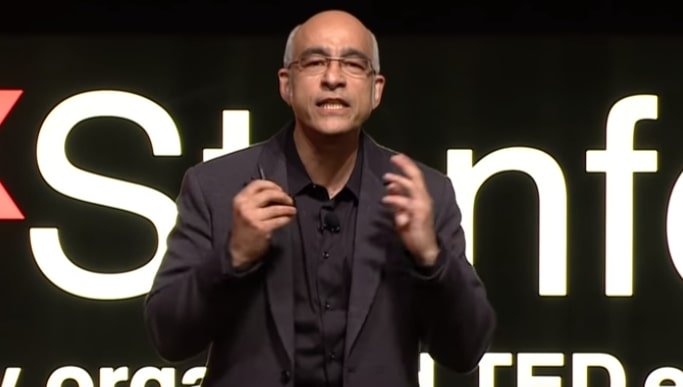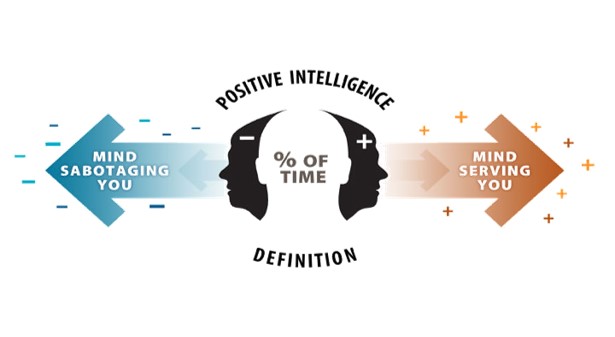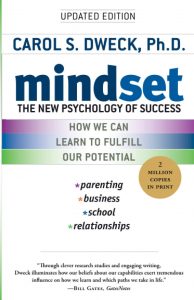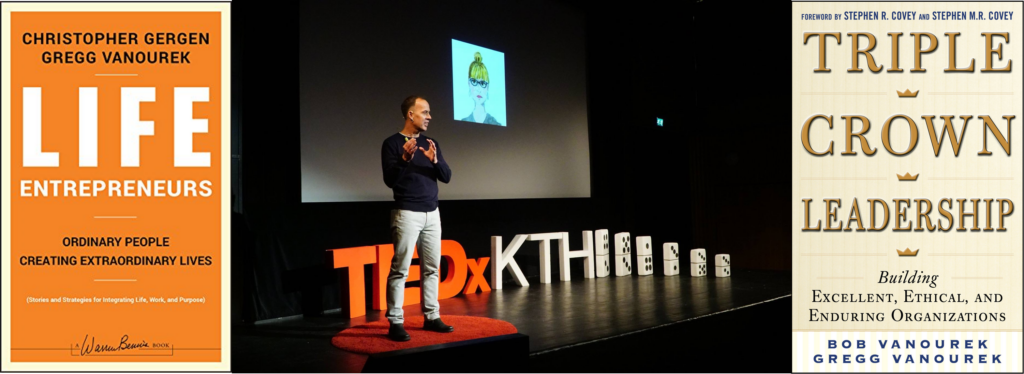Though we like to think of ourselves as free, many of us are confined to a mental prison we’ve built for ourselves.
“Our life is what our thoughts make it.”
-Marcus Aurelius, Meditations
Our most vicious jailer is our unhealthy “self-talk”—our inner critic that savagely sabotages us with haunting doubts and harsh judgments. We’re our own worst enemy.
We’re a prisoner of our “monkey mind”—feeling unsettled or restless and easily distracted by thoughts that bounce around like agitated apes. Often, we’re dwelling on the past or worrying about the future—always neglecting the present moment.
Most of our mental prisons are fictional stories our minds invent to prevent us from potential suffering. The sad secret, though, is that the suffering is wildly unlikely to occur outside our overactive imaginations. Our mental prisons are fear factories.
“My favorite cartoon shows two haggard captives staring through the bars of a prison window. The odd thing is that there are no walls on the prison, the two men are simply standing in the open, holding bars to their own faces with their own hands.”
-Martha Beck in Steering by Starlight
Sometimes our mental prison is the need we feel, often flowing from childhood, to gain approval and be liked or admired, or it’s the prison of the expectations of others (or, more accurately, what we presume those expectations to be, often wrongly).
Here’s the thing: We think we’re struggling with the outer game but it’s actually the inner game that’s tripping us up.
“Happiness is an inside game, literally and neurochemically.”
-Shirzad Chamine, author

Quality of Life Assessment
Evaluate your quality of life in ten key areas by taking our assessment. Discover your strongest areas, and the areas that need work, then act accordingly.
The Toll of Our Mental Prisons
These prisons are harmful in countless ways:
- Lower confidence, sense of wellbeing, and joy.
- Decrease in motivation and performance.
- Distorted perceptions: we’re looking at reality with an overlay of past memories and hurts as well as future hunches and worries, skewing our senses.
- Loss of our sense of control, agency, and responsibility—sometimes by blaming all our troubles on a single source (such as an ex-spouse, or an addiction), when in reality there are multiple factors contributing to problems (including our own mindset and behavior).
- “Learned helplessness”: a well documented phenomenon in which we give up after a number of futile attempts at something, eventually surrendering our agency even when there may be potential solutions and overlooking opportunities for change.
The Building Blocks of Our Mental Prisons
Building our own personal confinement is a strange endeavor, yet all too common. What drives it?
It begins with root causes that are exceedingly difficult to overcome because they’re often subconscious. First is depending on circumstances for our happiness: “If and when X happens,” we believe, “then I’ll be happy.” The logic seems sound, but it’s deeply flawed. We’re terrible at knowing what will truly make us happy and fulfilled over time, causing us to spend time on the wrong things. Also, with this logic, we’re placing our happiness in the hands of too many factors outside our control. The key is to learn to be happy and well regardless of our circumstances.
Second is our automatic emotional reactions to events, preceding our rational brain’s ability to interpret the situation from a higher level of consciousness and with a broader perspective and openness to different interpretations and possible responses.
There are also more mundane but also significant contributors:
- Digital device overload and constant scrolling or multitasking—placing our brains in a fog of mild anxiety.
- Perpetual busyness, which can lead to workaholism and burnout.
“Most people today live in relatively constant distress and anxiety. This is related to a low-grade but perpetual fight-or-flight response… in reaction to the challenges of life.” -Shirzad Chamine, Positive Intelligence

In her book, Mindfulness, psychologist Ellen Langer identifies several causes of mindlessness that also inhibit our mental wellbeing:
- Having a narrow self-image, such as defining ourselves solely by our work (e.g., as a project manager, bookkeeper, or customer service rep) as opposed to all of our multifaceted identities (for example, son or daughter, mother or father, friend, colleague, artist, gardener, athlete, etc.). Being overly invested in one part of our lives is risky because it’s likely to go up and down over time—and can even disappear entirely.
- Having false beliefs about common things. Example: conflating old age with poor health. While they’re correlated, they’re very different, and there are many examples of people who thrive mentally, emotionally, and physically in their later years.
- Preoccupation with expected outcomes that sometimes fail to materialize (based on many factors outside our range of influence), instead of a healthy focus on the process.
- Making faulty comparisons with others based on the outcomes they have (e.g., wealth, accomplishments) instead of the process they used to get them.

Crafting Your Life and Work Course
Regain clarity, direction, and motivation for your next chapter, starting with a powerful foundation of self-awareness and commitment to your values and aspirations.
Our Mental Saboteurs
Shirzad Chamine, an executive and best-selling author of Positive Intelligence, has done important work that can help us understand how we’re sabotaging ourselves with our thoughts.
He identifies nine “saboteurs,” which are “automatic and habitual mind patterns” that harm our ability to function effectively. As you read them, note which ones challenge you:
- Judge: finding fault with self, others, or circumstances
- Victim: focus on painful feelings as a way of earning attention or empathy
- Pleaser: flattering, recuing, or pleasing others to gain acceptance
- Avoider: putting off or avoiding difficult tasks or conflicts
- Stickler: excessive need for perfection, order, and organization
- Restless: needing perpetual busyness and never being content with what is
- Controller: anxiety-based need to control situations or others
- Hyper-achiever: depending on achievement for self-acceptance
- Hyper-rational: excessively analytical processing of everything, including relationships
- Hyper-vigilant: excessive vigilance that never stops, seeing danger around every corner (Source: Shirzad Chamine, Positive Intelligence)


Take the Traps Test
We all fall into traps in life. Sometimes we’re not even aware of it, and we can’t get out of traps we don’t know we’re in. Evaluate yourself with our Traps Test.
Fixed vs. Growth Mindset
Enter Carol Dweck and her pathbreaking research on mindsets. Dweck is a professor at Stanford University who studies motivation, personality, and development. She distinguishes between two mindsets:
- Fixed mindset: Belief that intelligence, abilities, and talents are fixed. People with a fixed mindset tend to:
-
- Want to look smart
- Avoid challenges
- Ignore useful negative feedback
- Feel threatened by the success of others
- Plateau early and achieve less than their full potential
- Growth Mindset: Belief that intelligence, abilities, and talents can be developed. People with a growth mindset tend to:
-
- Want to learn
- Embrace challenges
- Learn from criticism
- Find lessons and inspiration in the success of others
- Reach ever-higher levels of achievement

It makes an enormous difference whether we approach a situation with a desire to look smart or a desire to learn. Our mindset is especially evident in our reaction to failure:
Do we dread the prospect of failure because we view it as an embarrassing reflection on our competencies? Or are we open to the prospect of failure because we view it as a sign that we’re stretching ourselves in new areas?
Dweck notes that mindset plays an important role in virtually all aspects of our lives, from school, sports, and business to parenting, relationships, and more. Our mindsets shape our:
- enjoyment of challenging tasks
- goals and ideas about what we’ll strive for
- honesty when confronted with situations where we may not look as good as we’d like
- performance on tasks
We’re all born with certain predispositions, and our mindsets can vary in different areas in our lives, but here’s the good news:
“Can mindsets be changed? Can they be taught? Yes.”
–Carol Dweck, psychologist
How to Escape Mental Prison
If mental prisons are common to the human condition, what have we learned about ways to break free? Much, it turns out.
For starters, a surprising intervention involves breath work to change our physical and mental state: breathing deeply and intentionally, as with “box breathing.”
“Breath is the bridge which connects life to consciousness, which unites your body to your thoughts. Whenever your mind becomes scattered, use your breath as the means to take hold of your mind again.”
-Thich Nhat Hanh, The Miracle of Mindfulness
We also want to start noticing our thoughts more—observing the strange things that pop into our heads and spotting the negative patterns that reappear. It helps to label them (e.g., “My ‘controller’ is making me feel anxious, or “I’m being overly judgmental again”).

Personal Values Exercise
Complete this exercise to identify your personal values. It will help you develop self-awareness, including clarity about what’s most important to you in life and work, and serve as a safe harbor for you to return to when things are tough.
More Actions We Can Take
- Focusing on what we can control, and not worrying about the rest.
- Exploring different aspects of the issue with a sense of curiosity and fascination.
- Remaining open to new possibilities and alternate interpretations.
- Avoiding the trap of catastrophizing (assuming the worst or exaggerating our flaws).
- Changing our context to bring a different perspective and renewed energy, especially to a place that provides sanctuary.
- Replacing our inner critique with a more charitable and helpful narrative.
- Cognitive reframing: shifting our mindset to look at a situation or relationship from a different and more helpful perspective, such as redefining a problem as a challenge or puzzle that we become curious to solve.
- Playing: it often changes our physiology by moving us into a state of deep engagement or flow.
- Taking action: there’s freedom in action, and it reveals fear for the false phantom it is.
- Choosing what to think and be mindful about. Many people become passive victims of the random thought-stream in their minds instead of engaging their “observer” or deeper perspective and employing their ability to choose which thoughts to keep and which to dismiss as unproductive or unwelcome.
- Giving ourselves grace, acknowledging that nobody’s perfect and that the point of life is not to try to appear perfect or successful to others.
Reflection Questions
- Is your self-talk too negative?
- Are you disrupted by “monkey mind”?
- What will you do to start arranging your escape from mental prison?

Gregg Vanourek’s Newsletter
Join our rapidly growing community. Sign up now and get monthly inspirations (new articles, opportunities, and resources). Welcome!
Tools for You
- Traps Test (Common Traps of Living) to help you identify what’s getting in the way of your happiness and quality of life
- Quality of Life Assessment to help you discover your strongest areas and the areas that need work and then act accordingly
- Crafting Your Life & Work online course to help you design your next chapter and create a life you love.
Related Traps and Articles
- Overthinking, Rumination, and Worrying
- The “Trance of Unworthiness”
- Fear
- The Conformity Trap
- Caring Too Much about What Other People Think
- Settling
- Feeling Behind? It May Be a Trap
- The Comparison Trap
- Monkey Mind
- Neediness
- Catastrophizing
- The Power of Reframing
- How to Stop Our Negative Self-Talk
- How to Practice Acceptance When Things Are Tough
Postscript: Inspirations on Self-Talk
- “When you fight life you lose but only 100 percent of the time.” -Byron Katie
- “To me, real success is where I can be at peace in the midst of chaos.” -Peter Crone
- “I discovered that when I believed my thoughts, I suffered, but that when I didn’t believe them, I didn’t suffer, and that this is true for every human being. Freedom is as simple as that. I found that suffering is optional. I found a joy within me that has never disappeared, not for a single moment.” -Byron Katie
- “The mind is restless, Krishna, impetuous, self-willed, hard to train: to master the mind seems as difficult as to master the mighty winds.” –The Bhagavad Gita
- “The mind is its own place, and in itself can make a heaven of hell, a hell of heaven.” -John Milton, Paradise Lost
- “Everyone fails…. There is one other little question: ‘Did you collaborate in your own defeat?’” -John W. Gardner
- “If you get the inside right, the outside will fall into place.” -Eckhart Tolle
- “What a liberation to realize that the ‘voice in my head’ is not who I am. Who am I then? The one who sees that.” -Eckhart Tolle
- “The primary cause of unhappiness is never the situation but your thoughts about it. Be aware of the thoughts you are thinking. Separate them from the situation, which is always neutral, which always is as it is.” -Eckhart Tolle
Books that Will Help Free Your Mind and Mindset
- Carol Dweck, Mindset
- Eckhart Tolle, The Power of Now
- Ellen Langer, Mindfulness
- Shirzad Chamine, Positive Intelligence

Take the Traps Test
We all fall into traps in life. Sometimes we’re not even aware of it, and we can’t get out of traps we don’t know we’re in. Evaluate yourself with our Traps Test.
++++++++++++++++++++++++++++++
Gregg Vanourek is a writer, teacher, TEDx speaker, and coach on personal development and leadership excellence. He is co-author of three books, including LIFE Entrepreneurs: Ordinary People Creating Extraordinary Lives (a manifesto for living with purpose and passion) and Triple Crown Leadership: Building Excellent, Ethical, and Enduring Organizations (a winner of the International Book Awards). Check out his Crafting Your Life & Work online course or get his monthly newsletter. If you found value in this article, please forward it to a friend. Every little bit helps!



15 thoughts on “The Mental Prisons We Build for Ourselves”
WOW! Really excellent article! I’m saving this link to pass on to others that I know that need this so badly. I myself have just begun to dismiss negative thoughts that were hounding me. I’m going to check out these books and put them on my MUST read list.
So glad it was helpful Patricia. Yes, great books out there on this topic. Enjoy and all the best! -Gregg
Great read! It identifies the very elements of my thought processes I just discussed with my psychologist. Every time I have a critical mood swings he tends to recommend medication to (attempt to) “stabilize” my moods. Thank God that I’ve been able to separate the negative thoughts and choose a positive reality. I’ve been consistently able to learn from the challenges caused by the mood swings and successfully navigate to stability without the use of medication for more than5 years now. Thank you for this post.
So glad this post was valuable for you, V., and good for you for addressing this challenge so well. Impressive.
When I coach leaders, negative self-talk is sadly, often, a topic…this is an amazing, comprehensive perspective with actionable strategies. Thank you.
Ilana, I’m not surprised to find this is common among the leaders you coach. It makes me think of impostor syndrome. Good that you’re out there helping them with this. Wishing you well with it. -Gregg
GREAT article! Good job boss!
Thanks, Raquel, and glad you found value in this article! -Gregg
This is interesting content. I enjoy reading this. Thanks for sharing. Great post!
Great, in-depth article. very helpful. Thanks!
Many thanks, Richard. So glad you found value in this! -Gregg
Before, I always overthink what my and my kids’ futures become, but now I do not overthink. I keep working and chasing my dreams because I know all my prayers will be answered at the right time in God’s will!
I hope someday, all people having a hard time because of being confined to a mental prison we’ve built for ourselves will overcome this. Let’s live our lives how we want it and not by the social judgment we hear daily.
Hi there! I just would like to offer you a big thumbs up for your excellent information you have here on this post. I will be returning to your web site for more soon.
This book very helpful thanks keep up the good work